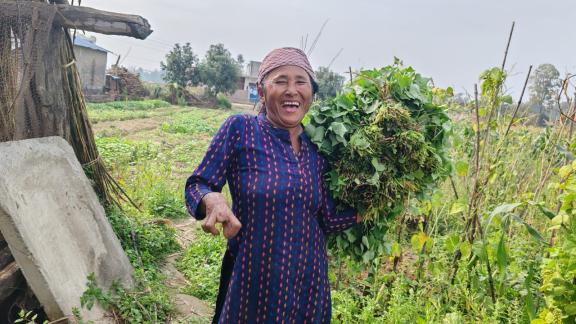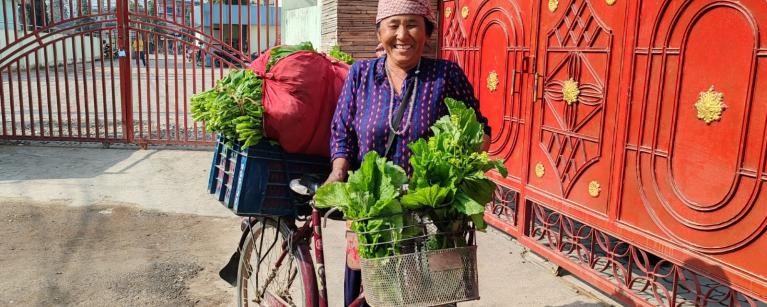Lanka Maya Tamang, 50 years old, was born in Dolakha district. At the age of 16, she was bitten by a poisonous snake on her right hand. Due to poverty and ignorance, her family did not take her to a medical center; instead, they tied a rope a few inches above the snakebite for two months. As a result, she lost mobility of her right hand, and this posed significant challenges in her daily life. Her parents were worried about her future and marriage.
Despite these challenges, she later married a man from a less privileged background. Her husband's relatives and neighbors criticized him for marrying a woman with disability, but her husband and in-laws were supportive.
Lanka Maya and her husband migrated to Rangapur village in Rautahat district, Madhesh Province in search of better opportunities. They worked as laborers on others' farms, but they struggled to make ends meet. After staying there for seven years, they relocated to a semi-urban area of Janajatitole, Chandrapur Municipality-6 around 15 years ago. However, there was not much change as they still relied on agricultural labor for subsistence.
Financial constraints made it difficult to provide education for their children (four sons and one daughter), so their children began working in hotels while also pursuing their studies.
The family was getting by somehow. In the meantime, she learned about Climate Change Adaptation and Advocacy (CCAAP) project implemented by Oxfam and Rural Development Center (RDC) to promote women’s economic empowerment. The project has been supporting rural poor women like Lanka Maya through introduction of climate adaptive farming approaches and technologies. She expressed her interest in the project and was eventually selected as a women leader farmer from her village.

Lanka Maya Tamang smiles while collecting vegetables from her farm. Photo credit: Jyoti Phuyal, RDC
Through the project, she received training on vegetable farming and was provided with vegetable seeds, pots for making organic pesticides and green-house tunnel. She learned how to grow vegetables under green-house tunnel with minimal use of chemical pesticides and fertilizers. Encouraged by the project's support, she leased 4 kaththa (around 1,350 square meters) land and started commercial vegetable farming. Additionally, she started procuring vegetables from local farmers in her village and selling them in the market, generating profit. She now earns three times more than before, making around 60,000 NPR (454 USD) per month by selling vegetables.
The project has further supported her in market linkages. She now provides organic vegetables to nearby hotels and vegetable markets. She has gained recognition as "vegetable sister" and "spinach sister" in Chandrapur area. She expresses happiness and gratitude as she has proved that disability need not be an obstacle to success.
